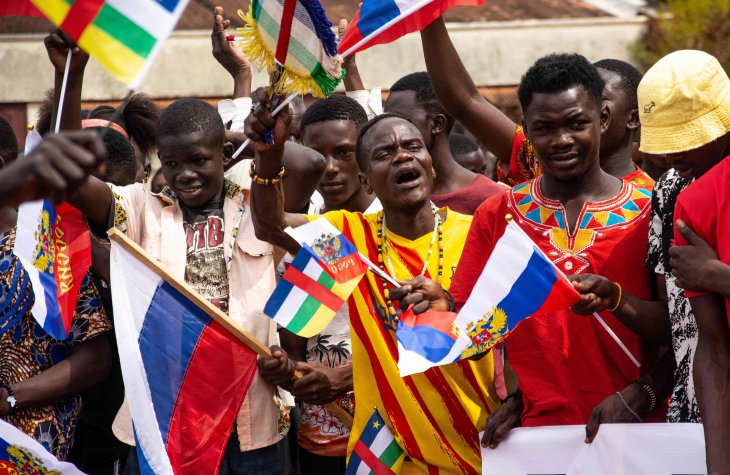After its first steps on the African continent in Libya in 2017, the Wagner Group has been deployed in Sudan, Mozambique, Madagascar, the Central African Republic, and at the end of 2021 in Mali. This rapid expansion over the years contributes to the instability and insecurity in these regions.

Russian and Central African Republic flags are waived by demonstrators gathered in Bangui on March 5, 2022 during a rally in support of Russia. Photo: Carol VALADE / AFP
The paramilitary Russian group known for its cruelty and human rights violations focuses primarily on protecting the ruling governing elites and developing a predatory approach to exploit local resources.
One important part of the Wagner group’s playbook – as Raphael Parens has labelled their strategy – relies on Russian media influence and disinformation campaigns amongst local populations.
Russian media influence
Two Russian state-funded media have expanded on the African continent over the recent years: the Russian television network RT, (formerly Russia Today), and the radio channel Sputnik. They broadcast in several languages, including French, English, and Arabic, enabling them to reach a large audience in Sub-Saharan Africa.
For example, in March 2022, RT and Sputnik respectively represented 6,2% and 12,8% of the francophone website visits in Burkina Faso. Accused of propaganda, these TV channels were suspended within the European Union as part of “restrictive measures” intended to weaken the media outreach capacities of Russia following the outbreak of the war in Ukraine. RT and Sputnik claim to provide an alternative vision in the international media space, saying they oppose mainstream media, liberal democratic norms and Western interventionism. This narrative has seductive power in Sub-Saharan and African francophone countries. Favourable foreign media coverage appears as a prerequisite for successful public diplomacy campaigns.
Propaganda
Russian state-owned channels are accompanied by disinformation campaigns in social media. The Internet Research Agency (IRA) – Russia’s so-called “troll farm” – creates and shares memes and images glorifying the Wagner Group or accusing France of plundering Africa.
Like Wagner, the IRA agency is funded by Kremlin-linked oligarch Yevgeny Prigozhin. These media and disinformation campaigns are the first approach of Wagner’s strategy in Africa.
Firstly, it allows the group to “test the temperature,” and find out whether they are wanted in the country, especially by the locals. This could be evaluated through the popularity of these media channels amongst the population.
Secondly, it creates a space for them to operate within. The disinformation campaigns disseminate anti-colonial discourse and rely on a pre-existing anti-French sentiment, especially in the Sahel region. It discredits France with a local perspective, as illustrated in a video circulating on social media since January 2023. Thanks to its visual form, the message can be understood by everyone: children and adults, literates and illiterates, French-speakers as well as non-French speakers. The IRA agency also accused French military operations in Mali of being a cover for exploiting local uranium mines. This fallacious information campaign accelerated the departure of French troops from Mali, leaving space for the Wagner group to take over the security assistance in the country.
Wagner’s playbook in Africa
When African leaders feel that Western involvement (via security and anti-terrorist operations) are lacking concrete results, they may call upon the Wagner group. Indeed, the Barkhane operation in the Sahel (that took place in former French colonies of Burkina Faso, Chad, Mali, Mauritania and Niger) as well as the UN peacekeepers in the Central African Republic could quite rightly be questioned regarding the security outcomes in these regions. Local political instability, enormous mineral resources, and Russia’s willingness to spread their influence is thus a perfect playground for Wagner’s expansion in Africa. The playbook of the mercenaries can be detailed in a three-tiered approach:
First, as mentioned above, the Wagner group relies on expanding Russian media channels in Africa and the use of disinformation to spread their ideas and make them legitimate.
Second, in return for their security services, they take control over resources, especially metal and mining licences. Wagner oversees these extraction projects through different companies. Once again, Prigozhin is involved, such as in the Central African Republic where one of his companies, Lobaye Invest, seized control over several mining locations, or in Sudan, where another extractive company affiliated to the founder of the Wagner Group secured several gold mining licences.
Finally, the Wagner Group is getting deployed and becoming militarily involved by providing training, personal security, or supplying arms provisions.
Wagner’s first steps in Mali opened the door to the Sahel. While the presence of the Wagner group in Burkina Faso has not yet been confirmed, the same playbook is seen in action in the country, especially when as it mimics developments witnessed in Mali a year ago. For instance, Russian flags were waved during local demonstrations and the junta recently kicked the French military troops out of the country. It will be interesting to observe whether Wagner has the means and the manpower to launch operations in other African countries, especially at a time when they remain massively involved in the war in Ukraine.
- Balthazar Sellier was an intern in the Dimensions of Security department at PRIO for five months in 2022-2023